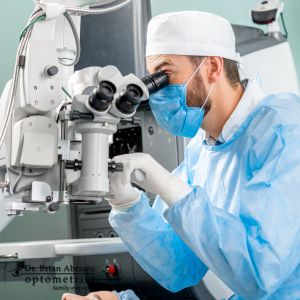Prescription glasses are a great way for us to compensate for changes in visual acuity on a daily basis. The right prescription in the form of frames or lenses enables us to better go about our day-to-day lives. Despite its many benefits, many people who wear glasses or use contact lenses look for an alternative that would simplify vision further.
To address the challenges of glasses and contact lenses, laser procedures for vision correction have become more popular than ever. There are multiple laser eye surgery options for those considering the procedure. The most popular choice in 2024 is Laser-Assisted In Situ Keratomileusis (LASIK). The other laser eye surgery on the market, Photorefractive Keratectomy (PRK), is less known than LASIK (despite being older). While both options for laser eye surgery are well-researched and have great success rates, understanding the fundamental difference between the two and their best uses can help you make a more informed decision when selecting the procedure you want. If you are looking for an optometrist in Woodbridge for a personalized laser eye surgery consultation, contact Dr. Brian Abrams to book an appointment.
Here’s what you should know to guide your decision between LASIK and PRK laser eye surgery.
What is LASIK?

- Laser-Assisted In Situ Keratomileusis, often referred to as LASIK, is the most popular laser eye surgery as of right now. The process involves a pre-surgery consultation to assess your eligibility for the procedure. When the day of the surgery comes, the procedure will involve the following:
- Your surgeon will prep your eyes with numbing drops
- They will then hold your eye open with an eye speculum.
- They will proceed by cutting a circular flap in your corneal epithelium.
- The surgeon will then open the flap and use lasers to gently reshape your cornea.
- Once they are done, they will fold the flap back over and allow it to heal.
One of the most significant pros of LASIK is that recovery is typically straightforward and painless. Most people only need a day or two to experience the change in their vision. You simply need to wear protective eyewear and avoid touching your eyes during recovery.
What is PRK?
- Photorefractive Keratectomy, often referred to as PRK, is an older laser eye surgery option that is still a common choice today. Similarly to LASIK, a pre-surgery consultation is also required before proceeding with the surgery in order to determine your eligibility. The most distinct differences between PRK and LASIK are that:
- PRK does not require your surgeon to cut a flap in your corneal epithelium
- Instead, the entire top layer of your corneal epithelium is completely removed
- Similar to LASIK, lasers will be used to reshape the cornea
- Afterwards, a bandage that is very similar to a contact is placed over the eye while the epithelium tissue grows back.
- This leaves no scar, unlike LASIK.
The one downside of the PRK is that the healing process is longer, as you have to wait for your corneal epithelium to regenerate in order to achieve the desired effect. Despite the more extended recovery period, the majority of the healing is done after only one week, and after one month, your vision should be better than ever.
For more insight on which options make sense for your eyes, talk to Dr. Brian Abrams, an experienced and trusted eye doctor in Vaughan,
Deciding Factors for Laser Eye Surgery
There are varying reasons why some people choose one of these laser eye surgeries over the other. The average person will often elect for LASIK due to the short healing time that is needed afterward. However, not everyone is eligible for LASIK. Those with very thin corneas are usually not eligible for LASIK, as there are more risks associated with cutting the flap. In this case, PRK is a much safer option. It is also recommended that athletes or people with active jobs receive PRK over LASIK. This is because intense physical activity can loosen your epithelial flap over time. Since there is no flap or cut made during PRK, this is more suitable for people who have more active lifestyles.
Choose the Best Option with Your Optometrist in Vaughan
Regardless of which procedure you think is best for you, it is always important to talk to an experienced optometrist in Vaughan before moving forward with surgery. Optometrists conduct eye exams to assess your eligibility and understand any existing conditions that could impact the suitability of laser eye surgery for you.
To get started today, book a consultation with Dr. Brian Abrams. With many years of experience, the trusted optometrist will help you make an informed and comfortable decision for your body and health.


